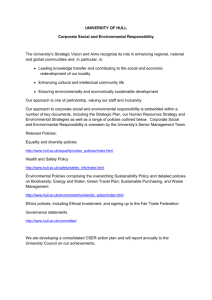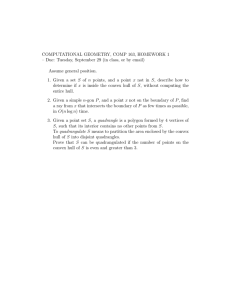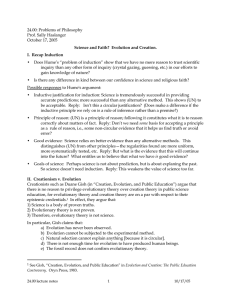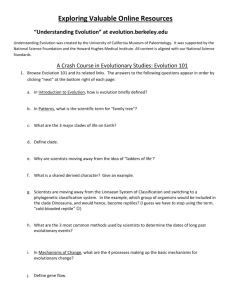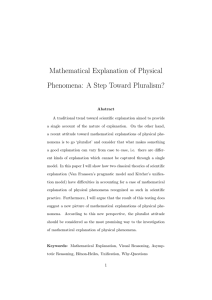Science and Social Structure Hull, Kitcher and various invisible hands
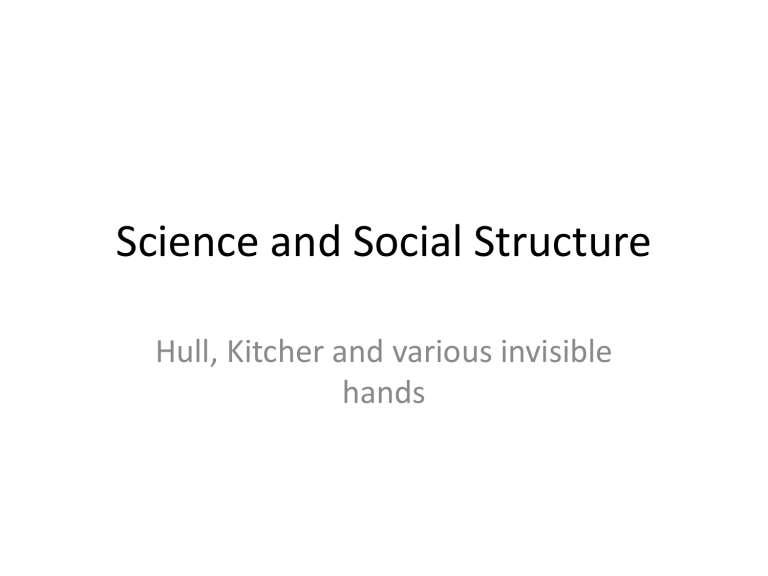
Science and Social Structure
Hull, Kitcher and various invisible hands
Human Nature?
• Above all, we are social primates.
• What we do as individuals is richly connected to our social situation and training.
• This natural description of us deserves a place (a substantial role, in fact) in our understanding of science.
• At a natural, descriptive level, science
2
(the special system of science that developed out of the scientific revolution) is a complex form of social activity.
• For a naturalist philosopher, this is a good place to start thinking about science and how it works.
And another thing
• Our special interest in science derives from the role it has come to occupy in our understanding of ourselves and the world, and from its role in many of the most impressive technical accomplishments of our civilization.
• One important question about science as a special sort of social system is, what features of science have led it to these interesting (and important) results?
Social Epistemology
• Since the ancient Greeks and continuing up to the nineteenth century, epistemology has been studied by focusing on the individual man (sic) and how he comes to know what he knows.
Hull’s evolutionary approach
• Credit is the principle currency for Merton;
Hull emphasizes credit and use.
• Because use is risky but indispensable, there is a real incentive to check and test the reliability of others’ work if you wish/need to use it.
• So strong commitments (and conflicts) are fine, because your work will only be adopted/used by others if it passes their tests of reliability and contributes to their aims.
Reproducers, interactors etc.
• The evolutionary story Hull tells involves reproducers
(ideas, concepts, theories?) that are passed down (with modifications) along lines of scientific descent.
• It also involves interactors, the scientists themselves, who compete with each other for credit using ideas/concepts they’ve acquired from others, modifying those ideas and concepts, and then passing them on to those who use their work.
• The upshot is selection for some reproducers, whose lineage continues, and selection against others, whose lineage fades and may even go extinct (at least as far as active use in science goes).
The example
• How to do taxonomy?
• Evolutionary taxonomy: focus on identifying the evolutionary relations between taxa and classify accordingly.
• Phenetics: focus on actual similarities and differences between taxa. (observational/ mathematical)
• Cladisitics: focus on shared-derived traits and use this to capture monophyletic groups.
• A major controversy, with aggressive interactions, from the ’50s to the ‘70s.
Worries
• Is this just a reflection of the individualist/ competitive ideology that dominates our society in general?
• There isn’t much in the way of epistemology here– but this can only work if we presume people have perfectly good knowledge of their interests as scientists in building the kind of work that will earn them credit…and that includes knowledge of a lot of truths about the field.
• This raises questions about just what the evolutionary story about ideas really contributes here…
• Hull’s own specialty raises an obvious question: does his use of selection derive from his own special interests?
Kitcher’s invisible hand
• For Kitcher the problem is to allocate resources.
• We can imagine doing it ‘from above,’ allocating workers to different lines of research to maximize the overall chance of success.
• The challenge for Kitcher is to set up the distribution of rewards in such a way that people pursuing their own interests will self-allocate in the same way.
• In effect, he wants to create a kind of market in which people can choose what program to work in on a ‘rational’ basis.
The solution
• Kitcher’s market will pay all members of the winning team an equal share of the spoils.
• As a result, the most promising program attracts most workers early on, but the potential share diminishes as numbers grow; at a certain point, the expected return of working on another program becomes higher, and workers divide between the two (just as the ‘high commander’ would want).
Worries
• Better markets? not equal shares, but shares by contribution to probability of success– creates a stronger incentive to shift to other programs when one is already well-staffed. Also, discourages free-riding (I may not contribute much, but I can join what looks to be the winning team and claim a share…).
• Again, assumes that scientists know a lot about programs and what their chances are, as well as about the rewards their work can bring– this is fair enough, but it needs more detailed philosophical treatment, and raises the question of just how much we need such
markets to make these decisions, if scientists already know so much about what they’rae up to.
Points worth adding
• Evolution and the senses: what has been selected for here, and what can we expect it to deliver, in terms of epistemology?
• Representation vs./ and similarity: Giere expects similarity between our models (as abstract objects) and aspects of the world. Is this really the right line? Won’t correlation do as well (or better)? What sort of similarity could exist between abstract objects and concrete features of the world?
Points worth adding 2
• Creativity (directed variation) is central here– selection is relatively easy to understand: nothing succeeds like success, nothing fails like failure…But the process that gives rise to new ideas is clearly not the undirected genetic change that occurs during biological evolution.
• Social norms: not just ‘overarching goals’, but ground-level, retail norms that govern individual interactions (truth telling & more) and many activities (attitudes towards discovery, understanding, truth as values in the scientific culture, along with detailed procedures/ systems of rules for observation, reporting etc.).
• It’s common, but cheap, to dismiss such norms and values as
‘ideology and window-dressing’. Consider the ground-level workers in science, who are trained in various procedures (norms of precision and accuracy, replicatability, standard formats etc.)

